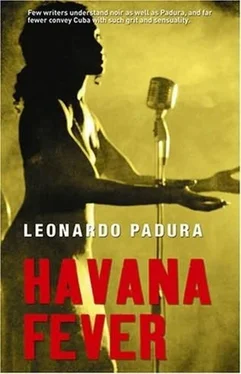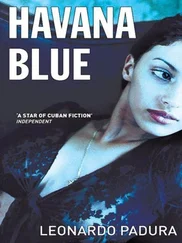Leonardo Padura - Havana Fever
Здесь есть возможность читать онлайн «Leonardo Padura - Havana Fever» весь текст электронной книги совершенно бесплатно (целиком полную версию без сокращений). В некоторых случаях можно слушать аудио, скачать через торрент в формате fb2 и присутствует краткое содержание. Жанр: Триллер, на английском языке. Описание произведения, (предисловие) а так же отзывы посетителей доступны на портале библиотеки ЛибКат.
- Название:Havana Fever
- Автор:
- Жанр:
- Год:неизвестен
- ISBN:нет данных
- Рейтинг книги:3 / 5. Голосов: 1
-
Избранное:Добавить в избранное
- Отзывы:
-
Ваша оценка:
- 60
- 1
- 2
- 3
- 4
- 5
Havana Fever: краткое содержание, описание и аннотация
Предлагаем к чтению аннотацию, описание, краткое содержание или предисловие (зависит от того, что написал сам автор книги «Havana Fever»). Если вы не нашли необходимую информацию о книге — напишите в комментариях, мы постараемся отыскать её.
Havana Fever — читать онлайн бесплатно полную книгу (весь текст) целиком
Ниже представлен текст книги, разбитый по страницам. Система сохранения места последней прочитанной страницы, позволяет с удобством читать онлайн бесплатно книгу «Havana Fever», без необходимости каждый раз заново искать на чём Вы остановились. Поставьте закладку, и сможете в любой момент перейти на страницу, на которой закончили чтение.
Интервал:
Закладка:
It was said of Rogelito that back in 1920 he’d been lucky enough to be a pupil of Manengue the fantastic, eccentric, alcoholic timbalero who’d wanted novel resonances from his primitive instrument and had enriched it by incorporating a cowbell’s metallic percussion and the rhythmic beat from the snare and a little Japanese wooden box, that with its sharp, torrid sounds became the basic percussive instrument for the danzón .
Despite this epic story, Conde wasn’t shocked to find the eternal Rogelito living in one of those narrow, crammed “passageways” in the barrio of Buenavista, in a tiny flat with flaking, damp-oozing walls, with no view of the street, squeezed between two other tiny flats equally sentenced to stare at the wall separating them from next door’s similarly dark, damp passage. As with all the musicians in his era, enough money must have passed through Rogelito’s hands to have bought, rented or even built a luminous, airy house. Like most, however, Rogelito had dressed swankily, and drank, smoked and fucked every peso away – not a bad option, come to think of it, Conde told himself – while finally taking shelter, with a clear conscience, in one of those asthmatic flats where old age and oblivion had caught up with him. Might the once high-living Violeta del Río be holed up in one of those dismal rooms?
After asking the Count to wait for a few minutes, the great-granddaughter responsible for caring for Rogelito, a creamy-white mulatto with over thirty solid, steamy years behind her, owner of nipples intent on drilling through her flimsy blouse and jutting buttocks where a man could sit, led the old man to a sprung armchair with extra cushions that looked like a throne for a patriarch fallen on bad times. Rogelito tottered out of his bedroom on his great-granddaughter’s arm, now unable to lift legs that had once danced in Havana’s best venues and the Count had the impression he was watching a candle burning the last thread of its wick. Apart from his irrepressible ears, that had once belonged to a man of average build, and his false teeth, keen to lend him a permanent, grotesque leer, everything about the old man seemed about to vanish and turn to dust as a consequence of the implacable chemistry of time.
Sitting back in his armchair, eyes wide open, trying to reap benefit from the light, Rogelito looked like a chick prematurely hatched from a giant egg, and the Count concluded that excessive old age might be the worst punishment ever meted out to man.
“Why did you want to see me, young man?”
“First of all to greet a real maestro,” replied the Count, thinking it would be rather indelicate to plunge straight into the reason for his visit.
“That’s strange. Nobody ever remembers me now.”
“Lots of books mention you. And there are old records…”
“That don’t put no food on the table.”
“True enough,” agreed the Count now hit by the aroma from the coffee percolating in a kitchen mixed with a poverty-stricken smell of burnt kerosene. “When did you stop playing, maestro?”
“Agh… about fifteen years ago. Something odd happened to me: I couldn’t read music any more, but was able to play any piece I’d played before. If you said, Rogelito, we’re about to start, El bombín de Barreto , or Almendra , I’d start thinking and wouldn’t remember a thing… But if I waited until the paila , and the piano or double bass played the first notes, I’d pick up the drumsticks and start to play, almost without knowing what I was doing, but never missing a beat. My hands were doing the thinking, not my head. But then I lost it,” and he waved his huge hands at Conde, out of proportion in relation to the rest of his physique, “these sons of a bitch gave up on me.”
His great-granddaughter emerged from the oppressive kitchen with a cup for the Count and a plastic beaker for the old man. The would-be coffee smelt of burnt split peas, and the Count waited for it to cool sufficiently to gulp down the unpleasant brew in one, and observed how Rogelito, helped by his great granddaughter, lifted his container with both hands and took small sips. Conde lit a cigarette, shifted his gaze from that depressing spectacle to those erect nipples marooned on a woman who was certainly tired of caring for an old man in the faint hope she’d inherit those four oozing walls and would, thus, be ready to grant herself a couple of hours of pleasuring without too much agonizing. Nervous, as he usually was in such circumstances, the Count focussed back on the image of the premature chick, with equine teeth and elephantine ears, and cut straight to the point. “Rogelito, someone told me you knew Violeta del Río…”
“One day we were having a few drinks in the Vista Alegre café before heading off to Sans Souci, where we were on at eleven. It was… hell, two thousand years ago, just imagine, you could order a coffee with milk on any street corner in this country. The point is that Barbarito Diez, the singer in the orchestra at that time, and I agreed a wager: as he didn’t drink alcohol and ate well, and didn’t go whoring but went to bed when he finished work, and I was quite the opposite, we laid a bet on who’d live the longest, a black guy who looked after himself as he did, or a mad black like me, and our witness was Isaac Oviedo. Isaac was my age, Barbarito a bit more of a kid, five or six years younger, but I gave him the advantage and, you know, I’ve buried poor Barbarito and poor Isaac, and both died at a ripe old age, and now there’s not a brick of the Vista Alegre left standing, let alone any memories… but I’m still here, heavens know why or what for… More than sixty years playing in whatever orchestra came along, drinking in every bar in Havana, having a ball till daybreak seven days a week, you imagine all the people that I knew. From the twenties onwards Havana was the city of music, of pleasure on tap, with bars on every street corner, and that gave lots of people a living, not just maestros like me, for yours truly spent seven years in the Conservatoire and played in the Havana Philharmonic, but anyone who wanted to earn money from music and with the spunk to keep going… After that, the thirties and forties were the heyday of dance halls, social clubs and the first big cabarets with casinos attached, Tropicana, the Sans Souci, the Montmartre, the National, the Parisién, and the little cabarets on the beach, where my mate Chori ruled the roost. But in the fifties it all increased ten-fold: more hotels were opened, all had cabarets, and night clubs became the fashion, there were God knows how many in El Vedado, Miramar, Marianao, and they couldn’t handle big orchestras, they only had room for a piano or a guitar, and a voice. That was the heyday of the people with feeling and heart-rending boleristas , as I called them. They were very special women, they sang because they wanted to and left their hearts on stage, lived the lyrics to their songs, and what they did was magic. Violeta del Río was one of them…
“I remember seeing Violeta three or four times, I think, I didn’t have time to go and see other musicians. Once in the Las Vegas cabaret and another in The Vixen and the Crow, where they had a tiny little dance floor. That day she wasn’t performing, I mean, wasn’t on the programme there, but sang anyway because she really felt like singing and Frank Emilio was at the piano because he really felt like playing and as they were both so keen, what they came out with was something you’d never forget even if you lived to be a thousand. Did I say Violeta was a fantastic female? Well, she was eighteen or nineteen and at that age even Mother Teresa of Calcutta’s a looker. She was olive-skinned, a dark tan, but not mulatta, with jet-black hair, and a big, beautiful mouth, with good teeth, that gave her lots of character even if they were a bit chipped here and there. But her eyes were her best asset: they could chill you to the bone if she pointed them at you, checked you inside and out, like an x-ray machine. She used to sing for the sake of singing all the time, so they said: she enjoyed singing boleros, always very quietly, always with a hint of scorn, half aggressively, as if letting you in on things from her own life. She had quite a husky voice, like an older woman who’d had to put up with a lot in life, and never raised her voice much, almost spoke rather than sang, but when she let rip with a bolero, people went quiet, forgot their drinks, as if she’d hypnotized the lot of them: men and women, pimps and whores, drunks and junkies. She turned out boleros that were dramas and not ordinary songs, as I said, as if they came from her own life and she was telling the whole world, there and then.
Читать дальшеИнтервал:
Закладка:
Похожие книги на «Havana Fever»
Представляем Вашему вниманию похожие книги на «Havana Fever» списком для выбора. Мы отобрали схожую по названию и смыслу литературу в надежде предоставить читателям больше вариантов отыскать новые, интересные, ещё непрочитанные произведения.
Обсуждение, отзывы о книге «Havana Fever» и просто собственные мнения читателей. Оставьте ваши комментарии, напишите, что Вы думаете о произведении, его смысле или главных героях. Укажите что конкретно понравилось, а что нет, и почему Вы так считаете.











